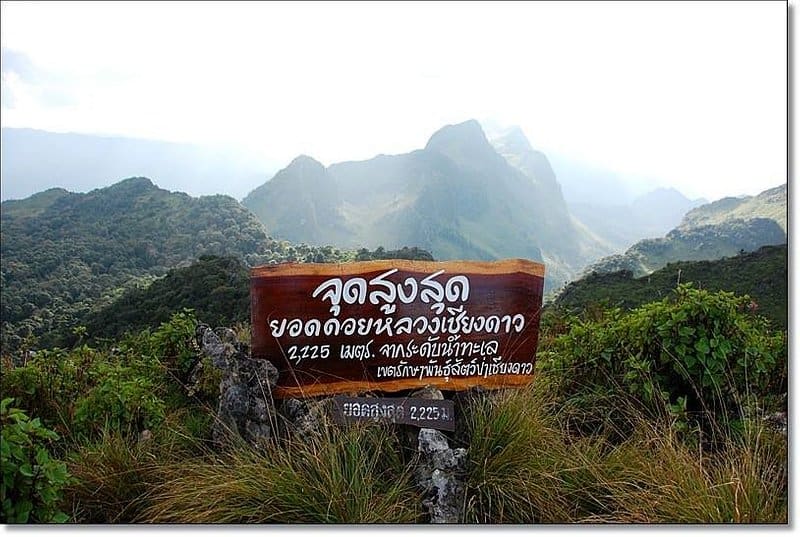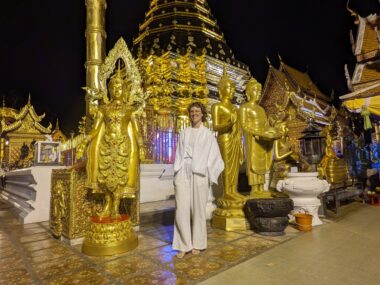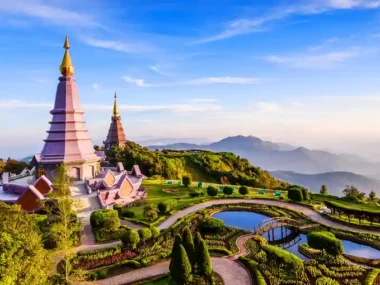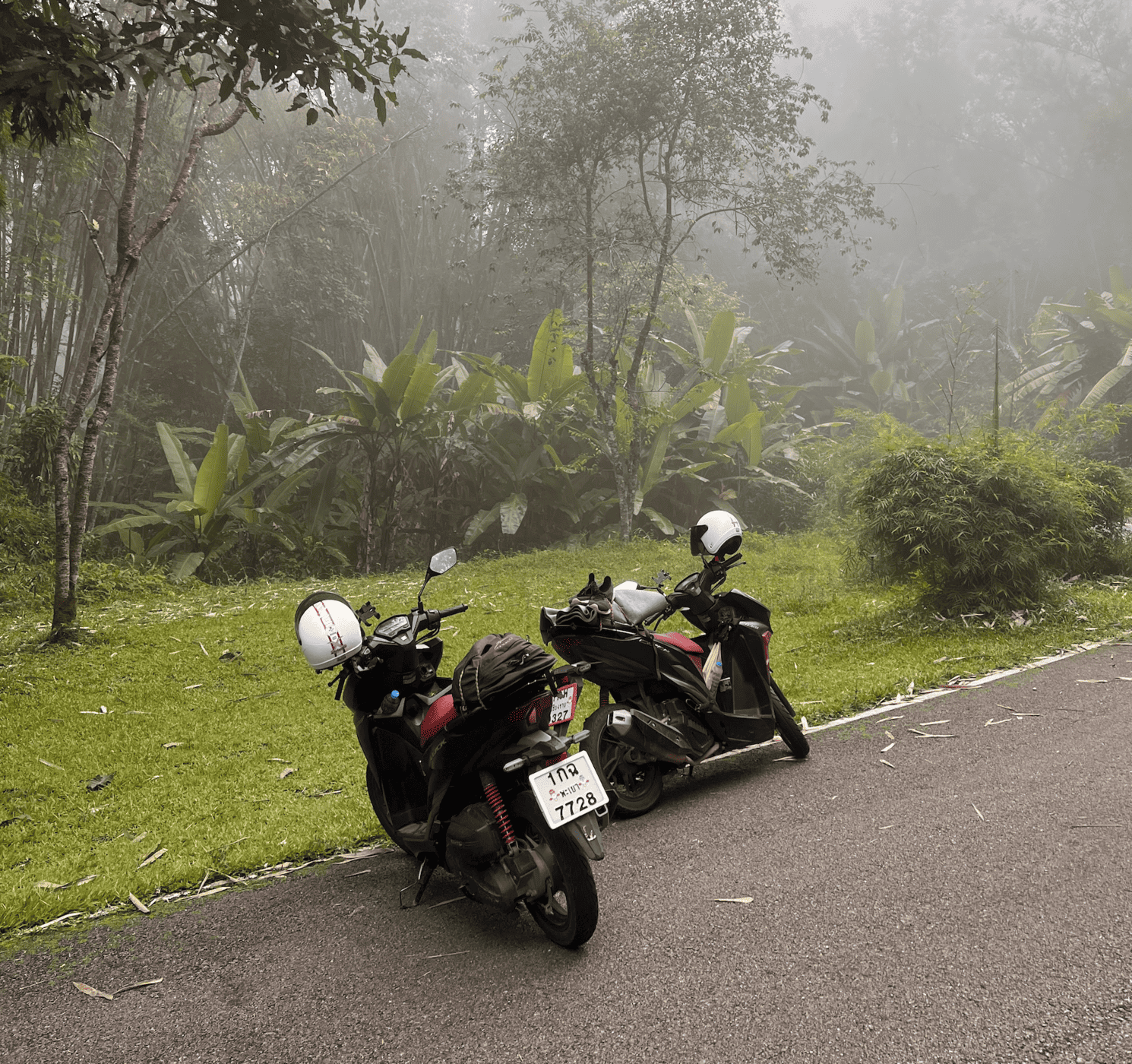Table of Contents

The 2 days I spent hiking with the Karen Hill Tribe through Doi Inthanon in Northern Thailand was an eye-opening and breathtaking experience. The trek takes you through the lush jungle, valleys of rice fields, and impressive mountain passes that are home to some of the most spectacular flora and fauna in the region.
Along the way, you will have an opportunity to learn more about this vibrant indigenous culture and help support their communities through eco-tourism initiatives. Ethnic Hilltribe Eco Trails fully supports the Karen Hill Tribe — with their help, you can learn about how this people group sustains their traditional lifestyle and earn a living from the land and through tourism.
In this article, we discuss the various ways that eco-tourism supports the Karen Hill Tribe, and how you can help as a trekker or traveler, too.
Eco-Tourism and Ethnic Hilltribe Eco Trails
What is Eco-Tourism?
Eco-tourism, also known as ecological tourism, is a form of responsible travel that focuses on preserving the environment and promoting sustainability. It seeks to be both educational and entertaining while making minimal impact on the natural environment.
Eco-tourism primarily involves visiting pristine areas that are largely undisturbed by humans and engaging in activities such as hiking, camping, birdwatching, wildlife photography, cultural programs, and educational tours. By practicing eco-tourism, visitors can gain valuable insight into the natural world while helping to protect it at the same time.
With eco-travel slowly growing in popularity around the world, it has become increasingly important to recognize its many benefits and promote sustainable practices within it.
The trekking and activities of Doi Inthanon offer an amazing opportunity to support local communities through eco-tourism. By going hiking and staying with the Karen Hilltribe, you can help raise awareness of their culture and provide economic benefits to their communities.
Ethnic Hilltribe Eco Trails was founded by Mit and Kischa, with a dream to provide people the opportunity to explore hiking in northern Thailand with its indigenous Karen population.
Believing in their home, the company desired to offer a genuine and personal insight into the region’s hilltribe culture through hikes along off-the-beaten trails, visits to traditional villages, and more.
Committed to sustainable tourism, Ethnic Hilltribe Eco Trails has seen firsthand how education and economic opportunities for families can lift entire communities out of poverty. Their mission is to share that knowledge by introducing guests to their hilltribe family and friends, showing them the spectacular beauty of northern Thailand’s rainforests and beyond.
Ethnic Hilltribe Eco Trails seeks to empower ethnic hill tribes and nearby localities through jungle excursions that promote responsible travel practices. Guests taken on the trek have access only to guides, porters, and drivers from their own local area, providing job security as well as sourcing training for tour guide licenses.
The company has additionally supported a family farm stay located on the 2-Day Doi Inthanon Trail by providing homestay training for both younger and older generations looking for an alternative income when unable to farm. This initiative further contributes towards helping families and offering more jobs in the Karen Hilltribe community.
The Hike

We started our two-day hike with a stop at a local market to gather supplies. This was a necessary part of the trip, as much of the route was off-the-beaten-path and not easily accessible by road. We traveled an hour from there to get to the start of the Doi Inthanon hike.
One thing I underestimated is that the hike itself was quite challenging due to its steep terrain and humidity. As soon as we left, we were met with the searing heat and humidity of the jungle. The difficult terrain at high altitudes added another level of challenge
Imagine this: I brought a jacket that would prevent me from getting soaked in case it rained. But I miscalculated the heat even with the potential rain Needless to say it was pointless to bring the jacket as I ended up completely drenched in sweat.
Imagine yourself climbing steep terrain with the sun bearing down and the humidity making it hard to breathe. All these factors would challenge even the most experienced hiker. Plus, the looming jungle and the chance of animals or insects crossing our path added to the challenge and excitement of the trek.
Fortunately, we had a guide named Pisak who was well-versed in jungle survival techniques. Not to mention he was hilarious! He gave us great advice on how to navigate the rainforest and provided us with helpful tips for survival. We also learned about the local animals, how to identify plants, and the importance of hydration, which helped us navigate the jungle as safely as possible.
Some of the coolest things we learned from Pisak were how to drink water from bamboo and how to choose the right leaves to make plates or bowls for eating. I had never eaten food from a leaf bowl before or drank water from a tree so there were a lot of firsts on this trip.
Supporting Local Communities

The Karen people have long endured a difficult history of oppression and discrimination. They were even excluded from the government conversations that may have changed their fate, leaving them with few options for sustainable futures.
Thankfully, eco-tourism has been a saving grace for the Karen people. It has enabled them to engage in activities like craftsmanship, hikes, and coffee production while still preserving the environment and their culture. This provides much-needed income as well as hope for a better future.
Plus, collaborations between villages, talks with the government, and tourism picking up are providing further opportunities for the Karen people. This is where you come in.
As a trekker or traveler, you can make a difference by supporting the Karen people through eco-tourism on your visit to Northern Thailand. You can purchase unique handicrafts or taste local delicacies to help them generate income for their community. These items and experiences will be unlike many other things you’ve ever experienced.
Ethnic Hilltribe Eco Trails

Ethnic Hilltribe Eco Trails is an Indian-based travel company that was founded by a husband and wife team, Amit and Rashmi Singh. The company was established in 2009 with the aim of promoting eco-tourism and responsible travel in India.
Amit and Rashmi Singh were both born and raised in India, and they have a deep appreciation for the country’s rich cultural and natural heritage. They were passionate about showcasing India’s diverse ethnic communities, their unique customs and traditions, and the stunning natural beauty of the country.
Through Ethnic Eco Trails, Amit and Rashmi aimed to provide travelers with an authentic and immersive travel experience that would not only be memorable but also sustainable and responsible. They believed that by promoting eco-tourism, they could help to preserve India’s natural and cultural heritage while also supporting local communities and promoting sustainable development.
Their tours are designed to provide travelers with an opportunity to learn about the culture, traditions, and daily life of the local communities they visit, while also engaging in eco-friendly activities such as trekking, wildlife watching, and birding. They also aim to promote sustainable tourism practices, such as using local resources and supporting local businesses.
Overall, Amit and Rashmi Singh’s vision for Ethnic Eco Trails was to create a travel company that would allow travelers to experience the beauty and richness of India in a sustainable and responsible way, while also supporting local communities and preserving the country’s natural and cultural heritage.
My Experience Hiking with the Karen People
The Doi Inthanon hike started with us eating passion fruit trees straight from the tree. This set the mood for what we would be experiencing on the hike: an adventure full of unexpected surprises. From seeing tarantula holes to tree pythons, there were definitely some scary moments too. Overall, it was a beautiful amazing experience. The hike was like going through a time machine, taking us back to when the world was untouched by humans.
The sights we encountered on the trek were breathtaking. We passed rice fields and waterfalls and even stopped for a quick swim. A cobra slithered by to say hello while we were getting dried off so that added a little extra excitement to the moment. We stopped to sample some of the local fruits like rambutan and mangosteen that were growing on plants around every corner.
It was a good feeling knowing that we were able to experience this opportunity to support these wonderful people firsthand, something that no documentary or TV show could ever match. From sleeping in huts, and making coffee from freshly picked beans to seeing Karen people cook and prepare their meals, the experience was truly unique.
How Hiking at Doi Inthanon is Supporting the Karen People

The hike at Doi Inthanon is a great example of how eco-tourism can support local communities. The local tribes in the area, such as the Karen and Hmong tribes, have traditionally relied on agriculture and forestry for their livelihoods. However, with the rise of tourism in the area, many of these tribes have been able to diversify their income by offering services such as homestays, handicrafts, and guided tours.
One of the most popular hiking trails at Doi Inthanon is the Kew Mae Pan trail. This trail is managed by the local Karen tribe, who have been trained in eco-tourism and have received support from the Thai government and non-profit organizations. The Karen tribe manages the trail and ensures that visitors follow responsible and sustainable tourism practices, such as not littering or disturbing the local flora and fauna.
The Kew Mae Pan trail provides visitors with an opportunity to experience the beauty of Doi Inthanon’s forests and learn about the local Karen culture and traditions. The Karen tribe also offers homestays for visitors who want to experience the local way of life and learn more about Karen culture.
By supporting the local tribes in this way, eco-tourism at Doi Inthanon is helping to preserve traditional cultures and ways of life, while also providing economic opportunities for local communities. In addition, eco-tourism helps to promote the conservation of the natural environment by encouraging visitors to explore the area in a responsible and sustainable way.
Conclusion
Eco-tourism is an important way to both explore a destination and support local communities. It gives travelers the unique opportunity of getting a more authentic experience through engaging with locals, as well as enabling them to support the local economy. For the communities, eco-tourism opportunities generate income while preserving their culture, environment, and traditional ways of life.
Travelers who want to make a positive impact should consider eco-tourism for their next journey. Organizations such as Ethnic Hilltribe Eco Trails are doing their best to uplift indigenous communities like the Karen people by providing these meaningful and sustainable travel experiences.
We urge everyone to join us in supporting these organizations so that marginalized communities may benefit from sustainable tourism initiatives all over the world.








1 comment
Comments are closed.